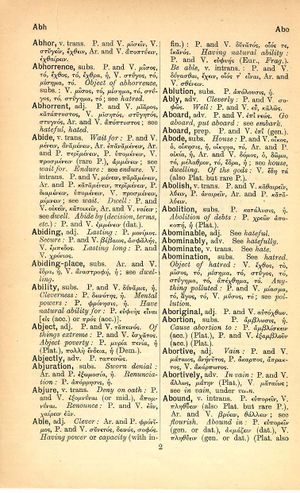able: Difference between revisions
From LSJ
μήτε δίκην δικάσῃς πρίν ἀμφοῖν μῦθον ἀκούσῃς → do not give your judgement until you have heard a speech on both sides
(Woodhouse 2) |
(CSV2) |
||
| Line 1: | Line 1: | ||
{{ | {{Woodhouse1 | ||
| | |Text=[[File:woodhouse_2.jpg|thumb|link={{filepath:woodhouse_2.jpg}}]]'''adj.''' | ||
<b class="b2">Clever</b>: Ar. and P. [[φρόνιμος]], P. and V. [[συνετός]], [[δεινός]], [[σοφός]]. | |||
<b class="b2">Having power</b> or <b class="b2">capacity</b> (with infin.): P. and V. [[δυνατός]], οἷός τε, [[ἱκανός]]. | |||
<b class="b2">Having natural ability</b>: P. and V. [[εὐφυής]] (Eur., Frag.). | |||
<b class="b2">Be able</b>, v. intrans.: P. and V. [[δύναμαι|δύνασθαι]], ἔχειν, οἷός τʼ εἶναι, Ar. and V. σθένειν. | |||
}} | }} | ||
Revision as of 09:03, 21 July 2017
English > Greek (Woodhouse)
adj.
Clever: Ar. and P. φρόνιμος, P. and V. συνετός, δεινός, σοφός.
Having power or capacity (with infin.): P. and V. δυνατός, οἷός τε, ἱκανός.
Having natural ability: P. and V. εὐφυής (Eur., Frag.).
Be able, v. intrans.: P. and V. δύνασθαι, ἔχειν, οἷός τʼ εἶναι, Ar. and V. σθένειν.

